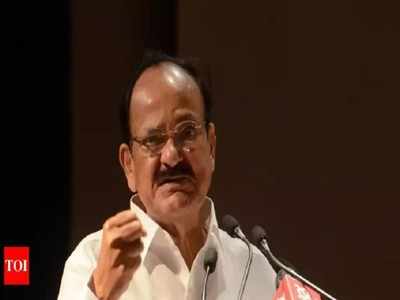- News
- India News
- Need for paradigm change in agriculture research: Vice-president Venkaiah Naidu
Trending
This story is from May 19, 2019
Need for paradigm change in agriculture research: Vice-president Venkaiah Naidu

GUNTUR: Stating that there is a need for paradigm change in agricultural research that makes full use of science and technology, vice-president M Venkaiah Naidu has observed that agriculture universities have bigger role to overcome the challenges of climate change and achieve food and nutritional security.
He anguished that marginalized people in dry areas are likely to be more seriously hit by the shifts in moisture and temperature regimes as a result of climate change.This is where agriculture universities should step in to bail out the country from the crisis, advised vice-president.
Addressing a national seminar on pulses cultivation at Acharya NG Ranga agriculture university here on Sunday, vice-president said that alternative policies and institutional changes were also needed to improve productivity from agricultural crops.
He explained that he came to know during his recent visit to Vietnam that the average productivity of rice in India is just around 3 tonnes per hectare, which is below the average productivity in Vietnam of around 5 tonnes per hectare.
He said that statistics underscore the need for agricultural universities in India to step up research on improving productivity of various crops and also to produce new, climate resilient high-yielding varieties. With pulses playing a pivotal role in promoting national food security, the country should introduce better seed varieties that are high-yielding, disease and pest-resilient, improve crop production techniques and bring additional fallow lands under pulses production. “There is also a need to ensure adequate MSP to the farmers,” said Venkaiah.
He, however, expressed anguish as majority of the farmers in India are motivated to grow either high MSP crops or cash crops like cotton and sugarcane. Pulses have been a second choice for the farmers for cultivation, he said. In an effort to make pulses more remunerative and accessible to the consumers, Minimum Support Price (MSP) for all major pulses was introduced which allows imports at zero duty and bans exports, explained vice-president.
He emphasized that greater attention has to be paid to harvest the huge potential of summer pulses in Indo-Gangetic plains and rice fallows.
“Keeping in view of growing water scarcity, population growth, climate change and variability, crops that use less water should become part of the strategy to increase food production. There is a need to promote arid legumes which have the inherent capacity to be resilient and withstand climate change. Also, the legume basket has to be expanded by adding minor grain legumes. This will also act as a buffer when major grain legumes are not successful due to drought,” said vice-president. Agriculture university vice-chancellor Dr Damodar Naidu and senior officials were present.
He anguished that marginalized people in dry areas are likely to be more seriously hit by the shifts in moisture and temperature regimes as a result of climate change.This is where agriculture universities should step in to bail out the country from the crisis, advised vice-president.
Addressing a national seminar on pulses cultivation at Acharya NG Ranga agriculture university here on Sunday, vice-president said that alternative policies and institutional changes were also needed to improve productivity from agricultural crops.
He explained that he came to know during his recent visit to Vietnam that the average productivity of rice in India is just around 3 tonnes per hectare, which is below the average productivity in Vietnam of around 5 tonnes per hectare.
“It is far below peak farm productivity in select farms in Vietnam which is around 7-8 tonnes per hectare and productivity in countries such as Egypt is at 7.7 tonnes per hectare. Similarly, the productivity of soya bean in India is around one tonne per hectare as against around 1.5 tonnes per hectare in Vietnam,” said Venkaiah Naidu.
He said that statistics underscore the need for agricultural universities in India to step up research on improving productivity of various crops and also to produce new, climate resilient high-yielding varieties. With pulses playing a pivotal role in promoting national food security, the country should introduce better seed varieties that are high-yielding, disease and pest-resilient, improve crop production techniques and bring additional fallow lands under pulses production. “There is also a need to ensure adequate MSP to the farmers,” said Venkaiah.
He, however, expressed anguish as majority of the farmers in India are motivated to grow either high MSP crops or cash crops like cotton and sugarcane. Pulses have been a second choice for the farmers for cultivation, he said. In an effort to make pulses more remunerative and accessible to the consumers, Minimum Support Price (MSP) for all major pulses was introduced which allows imports at zero duty and bans exports, explained vice-president.
He emphasized that greater attention has to be paid to harvest the huge potential of summer pulses in Indo-Gangetic plains and rice fallows.
“Keeping in view of growing water scarcity, population growth, climate change and variability, crops that use less water should become part of the strategy to increase food production. There is a need to promote arid legumes which have the inherent capacity to be resilient and withstand climate change. Also, the legume basket has to be expanded by adding minor grain legumes. This will also act as a buffer when major grain legumes are not successful due to drought,” said vice-president. Agriculture university vice-chancellor Dr Damodar Naidu and senior officials were present.
End of Article
FOLLOW US ON SOCIAL MEDIA










